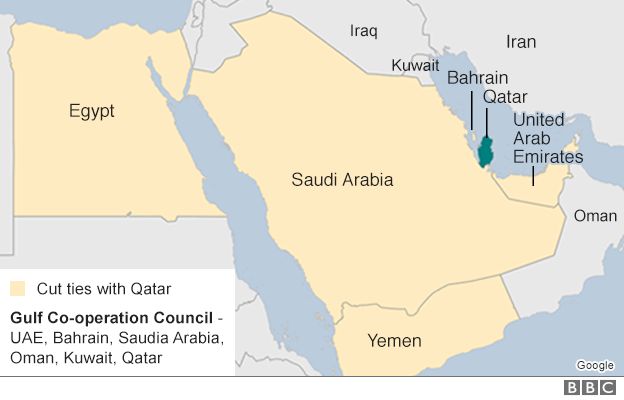
This article is more than
8 year oldForeign minister Sheikh Mohammed bin Abdulrahman al-Thani said he favoured diplomacy to resolve the escalating crisis and that there was no military solution, Reuters reported.
Qatar rejects claims it is a leading supporter of Islamist extremism.
Meanwhile, Qatar's Al Jazeera network said it was suffering a cyber-attack.
"Al Jazeera Media Network under cyber-attack on all systems, websites and social media platforms," it tweeted. The network has been in the crosshairs in the current dispute, and other Gulf countries blocked it in late May.
On its website, Al Jazeera said its services were all still working but the attacks "are gaining intensity and taking various forms".
Meanwhile, Qatar's state-run TV station later said it was shutting down its website temporarily because of hacking attempts.
In other developments:
Saudi Arabia and other states cut travel and diplomatic links on Monday. The emir of Kuwait is trying to mediate the row, carrying out shuttle diplomacy between Qatar, Saudi Arabia and the United Arab Emirates (UAE).
This is a region largely of absolute monarchs - kings or emirs - who have in common a very firm grip on politics at home to head off any dissent that could represent a threat to their individual regime survival.
But the emir of Qatar pursues a series of policies that simply don't fit into the rigid orthodoxy expected by most of the others, notably Saudi Arabia, the superpower of Sunni Islam.
His unconventional foreign policy is seen as a threat to Sunni solidarity, particularly because the emir and his ministers promote dialogue and a search for good relations with the rival regional superpower, Shia Muslim Iran.
Saudi Arabia is deeply hostile to that approach, and now feels empowered to turn that hostility to action, in the certain knowledge that a new US president, Donald Trump, is at Saudi King Salman's side.
Addressing reporters in Doha on Thursday, Sheikh Mohammed said Qatar had been isolated "because we are successful and progressive".
"We are a platform for peace not terrorism. This dispute is threatening the stability of the entire region," he said, adding: "We are not ready to surrender, and will never be ready to surrender, the independence of our foreign policy."
He said Iran had offered the use of three of its ports to ship food and water to Qatar as supplies ran low, but he said the offer had not yet been accepted.
Qatar is heavily dependent on food imports and the crisis has led to stockpiling and shortages.
Sheikh Mohammed said Qatar had never before experienced such hostility.
In another development, Russia said Sheikh Mohammed would fly to Moscow for talks with his Russian counterpart, Sergei Lavrov, on Saturday.
They will discuss "urgent international" issues, Tass news agency reported, but there were no further details.

BBC diplomatic correspondent James Robbins says Russia's intervention could complicate existing efforts to defuse the situation.
Several countries including the UAE, Saudi Arabia and Egypt cut diplomatic and flight links with Qatar on Monday. Saudi Arabia also closed its land border, a vital lifeline for supplies.
Saudi Foreign Minister Adel al-Jubeir has said Qatar needs to cut ties with Palestinian Islamist group Hamas in the occupied territories, and the Muslim Brotherhood in Egypt, if it wanted to end its isolation.
Meanwhile, Bahrain has joined the UAE in threatening jail terms for anyone voicing support for Qatar.
"Any expression of sympathy with the government of Qatar or opposition to the measures taken by the government of Bahrain, whether through social media, Twitter or any other form of communication, is a criminal offence punishable by up to five years in prison and a fine," a statement from the interior ministry said.

Turkey, in an apparent act of support for Qatar, has approved a bill allowing more troops to be based there. The Turkish president has also offered to mediate.
Qatar is also home to the biggest American air base in the region.
US President Donald Trump urged Gulf unity in a call to Saudi Arabia's King Salman, US officials said on Wednesday.
However, he had earlier claimed credit for the pressure placed on Qatar saying his recent visit to Saudi Arabia was "already paying off".